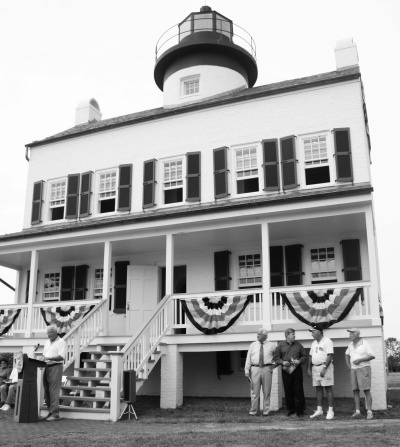
The original Blackistone Lighthouse was built in 1851 and stayed in use until 1932. This reconstruction was done from the original drawings by local contractors, either working for free or at a reduced cost. (Photo: Andrea Shiell)
HOLLYWOOD, Md. (June 26, 2008)—St. Mary’s County residents, tourists, dignitaries, and history buffs seemed happy and relaxed as they gazed out over the Lower Potomac, perched on a series of wobbly water taxis plowing towards St. Clements Island for Sunday’s festivities.
All were gathered to celebrate the opening of the newly reconstructed Blackistone Lighthouse.
There were many there who may not have anticipated this project actually being completed. It started with $5,000 and an idea to build a park bench or plant a tree to honor Josephine Mattingly’s grandmother, Josephine McWilliams Freeman, one of only a few women who were allowed to serve as lighthouse keepers in her day.
It took many years, but the project eventually blossomed into a complicated and ambitious $600,000 mission to reconstruct the beacon that once lit the waters for Maryland’s first settlers from St. Clements Island.
“A couple of years ago…a lot of us said it was just a lot of talk, it would never happen,” said Del. John Wood as he gazed up at the tower overlooking the landscape, smiling. “We’ve got something here that we’re very proud of.”
“This is a great place,” exclaimed Sen. Roy Dyson at the ceremony. “This is where Maryland was founded...this was the GPS system of its time.”
Indeed, history tells us the first settlers in Maryland came to St. Clements Island in 1634, having veered off course hoping to avoid Piscataway native warriors who were waiting along the banks of the Chesapeake for the settlers to land. From there, the island became a part of the Blackistone family, who set up residence and used the property as a dowry for their daughter in her marriage to Mr. Nehemiah Blackistone in 1669.
The lighthouse was constructed in 1851 for $5,537, and stayed in use until 1932, when sophisticated land transportation made the lighthouse obsolete, and it was decommissioned by the federal government.
The lighthouse stood until it was destroyed by a fire in 1956. Since then, erosion has dwindled the island from its original 400 acres to about 40 acres today, and the reconstruction had to be placed further inland, but except for a few minor changes, the building was constructed using the original drawings and plans of John Donahoo, who had built the first one more than 150 years ago.
It includes 18-inch thick walls, mahogany casements under the windows, a living area, bedrooms, a storage floor, and four fully functioning fireplaces.
“We won’t be able to have an actual lighthouse light, because the federal government commissions those, but we probably will have a safety light so people can have an idea of what it looked like,” said volunteer Mary B. Cheseldine.
Those looking closely may even notice the 30-star flag flying over the field behind the lighthouse, reflecting the state of the union at the time the original lighthouse was constructed.
Among the dignitaries present were the St. Mary’s Board of County Commissioners; Maryland State Sen. Thomas “Mike” Miller; St. Clements Hundred President Dick Gass; former Maryland Governor Marvin Mandel and school Superintendent Michael Martirano, who said he would be pushing for field trips to the site when reservations could be scheduled.
Many were simply happy to enjoy their walks up to the top of the lighthouse tower, despite the broiling heat at the top level.
“It’s so nice to see it done,” said visitor Jerry Goodwin from Lexington Park as he looked out from the top of the tower. “I came kayaking here last year and this was just a shell. It’s amazing they got it done so fast.”
The speediness of the project once it got past the planning stages was due to the contributions of local contractors, who agreed to work on the project either at cost or for free.
“I’m just sorry I couldn’t donate my own time for the construction,” said St. Clements resident Bill Fisher, a member of the St. Clements Hundred. “But it’s beautiful.”
The formal ceremony was kept short due to storm warnings, but blessings abounded, recalling more of the island’s history with an echo to the country’s first Catholic mass being said at the site.
“The lighthouse needs a human touch” said Reverend Kathleen Price from All Saints Episcopal Church when talking about the St. Clements Hundred and the Blackistone Foundation’s volunteers.
With the promise of thunder on the horizon, it seemed fitting that she would mention, “if there were no storms, there would be no need for a lighthouse. If there were no lighthouses, these storms would most likely end in tragedy.”
Joe St. Clair, President of the Blackistone Lighthouse Foundation, said all funds that had been pooled but not used in the new site’s construction would go to maintain the lighthouse for generations to come.
“You need to know your history,” he said. “You need to pass it on to your children, and their children. That’s what keeps the light lit.”


